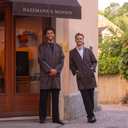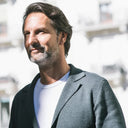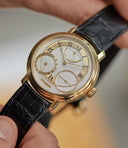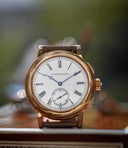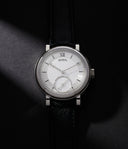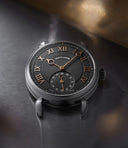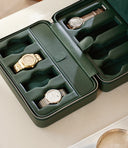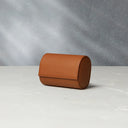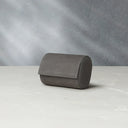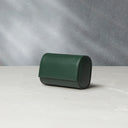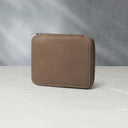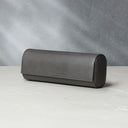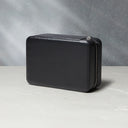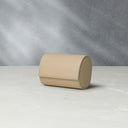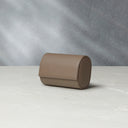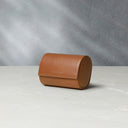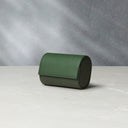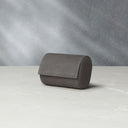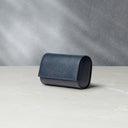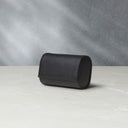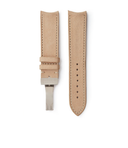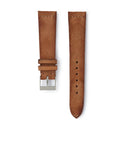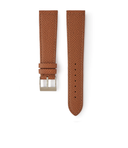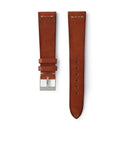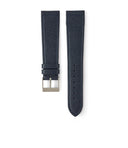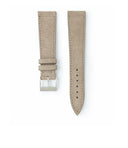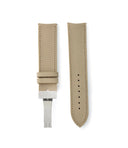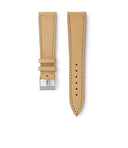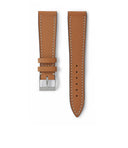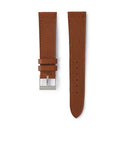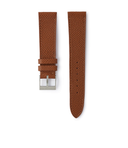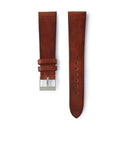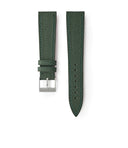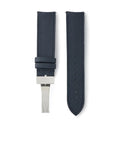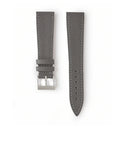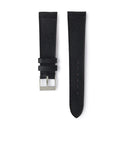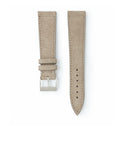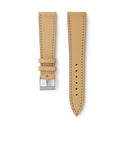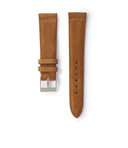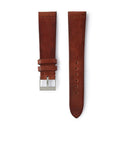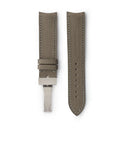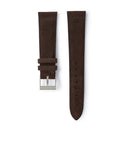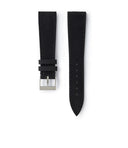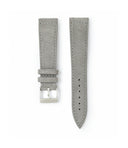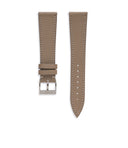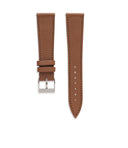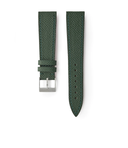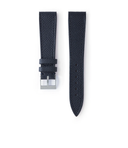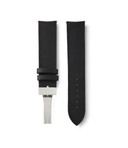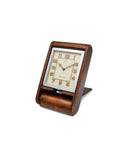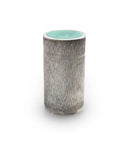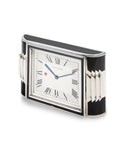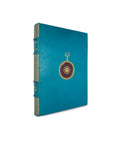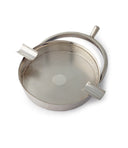Interview: Michael Clerizo
In the growing world of watch blogging, truly meaningful reports are becoming harder and harder to come by. For our latest interview, we sat with journalist Michael Clerizo of The Wall Street Journal, who has been faithfully reporting on all matters horology since the early 2000s. Clerizo’s contribution to the cause spans books, talks and articles born of a deeply-held passion for great watchmaking.
Let’s start where it all began for you…
Oh, gosh. My father’s Tissot played a big role in my introduction to watches. Something I realised early on was that watches were clearly very important to men, at the risk of sounding sexist. [laughs]
[Laughs] Ok…
For my father’s generation, watches mattered, and they all had good mechanical watches. Now, of course, growing up in America a lot of them were Timex, some Hamilton but my father always bought Swiss. My uncles also had Swiss watches like Rolex, Omega and there were a couple of Pateks scattered in there.
A great selection…
Coming from an Italian family, we paid a lot of attention to what certain Italian celebrities were wearing, in particular Frank Sinatra, and Frank wore a lot of nice watches...
What sorts of things were guys like that wearing?
Well, I wasn’t so aware in those days exactly what they were wearing, but it was more the fact that they wore nice watches. There was an impression that their immaculate look wasn’t finished until they strapped a watch on their wrist.

When did your acute interest crossover into obsession?
It wasn’t until much later that watches would become such a big part of my life, and it took an unfortunate incident to initiate it. I was travelling in Asia with my wife and when we came back to London I got really sick to the point that I was kept in the hospital for 11 nights. Now, you tell me how sick do you have to be for the NHS to keep you for 11 nights…
Death's door…
I was in the infectious diseases ward, all very 19th Century stuff, but I had to be isolated.
What was the problem?
Well this is where the mystery begins, I remember feeling fine, then suddenly I stood up in our living room at home and fell back down. I couldn’t function at all. Permission to be vulgar now…
Permission granted.
I was asked to give a urine sample, and a very nice jewish doctor, an older woman said, “Okay, I think you’re sick,” I said, “You can tell that just by looking at my urine,” she said, “Well, it’s grey…” [laughs]
"Within half an hour I was in the Royal Free, my skin blistering with pus and blood; it was not a pretty sight."
[Laughs] Yikes…
Within half-an-hour I was in the Royal Free, my skin blistering with pus and blood; it was not a pretty sight.
That certainly doesn’t sound fun…
I had gotten such a fever that I woke up one day covered in ice. Being an American, I made a very typical joke, “Can’t get ice for a drink in a bar over here in the UK but they can cover me with ice in the hospital” [laughs]
[Laughs] Fair point…
The doctor said to me, “We thought we were going to lose you last night, the ice was a desperate attempt to lower your dangerously high fever.” Every time the nurses came into the room, they made the sign of the cross.

Not exactly what you want to see when you’re in that situation…
[Laughs] No, but that certainly made the magnitude of the situation clear to me.
Did they ever get to the bottom of what was wrong with you?
No, not once. It went on for months and months and my doctor and I were fans of Russian literature, so we decided to call it Russian novel syndrome, because in Russian novels people were always getting fevers and taking six months to recover.
So, where do watches fit into this?
I had been doing a lot of video work at that time, getting up at six o’clock and it had gotten quite tiresome. I decided that I wanted to write instead, to which my wife said, “What are you going to write about then?” I said, “Oh, I’ll think of something.” [Laughs]
"I got a lucky break writing for the FT, but never about watches."
[Laughs] And…
Well, I got a lucky break writing for the FT, but never about watches. After a while of that, I got a call from an editor, not from the FT, who asked me if I knew anything about watches, I said, “yeah, sure, I know all about watches,” the standard freelancer response; you do not say no to anything.
[Laughs] right, so what was the first assignment?
They asked me to write 1,000 words on three watch brands. I gave off an air of confidence, but I didn’t really know what to cover. The commissioner asked me what brands I’d like to write about, I said, “Right, okay…”
[Laughs] Right…
Vacheron Constantin came to mind as my father had one, okay that’s one. I was doing what a lot of freelancers do in downtime, read magazines, and what’s on the back cover of every magazine, Patek Philippe, so I said, “Patek Philippe.” Two in the bag, and finally a Franck Muller Master Banker. I had no idea what this was, but a friend of mine in New York told me he had bought one, so that was that.
What an awful name for a watch…
[Laughs] Yes, it is, isn’t it. I started to research these watches, a part of the job that I’ve always enjoyed, and began realising that watches bring together science, engineering, design, physics, geometry, all those things, and there was also a huge amount of history to draw upon.
What was it exactly that you ended up writing about, was it technical or more philosophical?
I couldn’t do technical at the time, I didn’t know nearly enough, so I wrote about how if you buy into Vacheron, for example, you’re buying into 250 years of history. It was all along that sort of line of thinking.

Let’s talk brands and design. How do you feel brands are performing these days in that respect?
I used to say that there was no such thing as a trend in this industry, but this was years back. Some brands seem to be taking a shotgun approach to what they offer the market. Every brand has an ultra-thin collection, a chronograph, a world timer, very simple time only, incredibly complex etc, so there’s a span of watches available which was not the case twenty years ago.
Do you see this as a positive or a negative?
It’s positive for sales, but I don’t think it’s always good in terms of design. If you want a good example, google the Patek Philippe Neptune…
[Laughs] Unfamiliar…
The Neptune came out after the Nautilus in an attempt to secure more of the sports watch market and it didn’t work. Some brands just go too far too soon from their roots and that just often doesn’t work.
This is something which Jean-Claude Biver has been quite vocal about, particularly where Zenith is concerned…
Well, a friend of mine was in the first meeting that Jean-Claude Biver ever had at Omega…
"Jean-Claude arranged them all and placed them down on the table and said, “Do you want to know where you get your inspiration from?” He pointed to the Omega Museum and said, “There. An Omega has to be an Omega, and a Rolex has to be a Rolex."
Wow, that’s going back.
He told me that three designers came into the room and showed him some designs, all very avant-garde designs for Omega, and Jean-Claude arranged them all and placed them down on the table and said, “Do you want to know where you get your inspiration from?” He pointed to the Omega Museum and said, “There. An Omega has to be an Omega, and a Rolex has to be a Rolex.” I think that’s a very important aspect of great watch branding, because you have to be true to your roots and if you are, you won’t be like everyone else, you’ll achieve distinction.
Right…
We want difference, watch lovers want choice. Some of us prefer Seamasters to Submariners, others prefer Speedmasters to Daytonas. The fashion industry works on trends, the watch industry shouldn’t, we want brands to be true to their roots.
How does a brand ensure that it gets that balance of history and future correct?
Well, that’s a very good question, and it’s a very difficult thing to do. There’s no way of knowing something will be a hit, and this is something that is true of many industries; the film industry comes to mind. I remember being told by Marc Hayek when Breguet had developed the Queen of Naples watch, which they showed to their retailers and got a lot of backlash. They were saying, “What is this egg shaped watch, it will never sell.” Well, of course the Queen of Naples was a great success for Breguet.
Absolutely…
People were saying the same thing about the Omega co-axial escapement, there was consternation around the world, people saying, “Oh no…”
Why were people against it?
They were sponsoring James Bond at the time and the feeling was that there was a disconnect between watch technology and Bond. He’s all about the look, masculinity, being tough and getting laid… [laughs]

[Laughs] Right…
Don’t put that in. Actually, put that in, I don’t mind [laughs]
[Laughs] Ok…
Well, it’s the truth. The co-axial is now synonymous with Omega and no-one, other than Roger Smith can put a co-axial escapement into a watch because Omega owns it. It’s very difficult for brands to straddle this line, I’m sure Patek Philippe won’t mind me saying that about the Neptune, but brands can be like politicians, they have to appeal to the base, but at the same time have to grow.
Do you think this approach breeds mediocrity and caution?
It doesn’t in terms of the movements, and it doesn’t where materials are concerned, but there is definitely a sameness in designs within a collection. Some brands handle that very well, Vacheron Constantin for example, or Hermes...
Absolutely…
Another person who does a fantastic job is Francois-Paul Journe, who I think is an incredibly significant watchmaker, because what he’s done relates to the history of watchmaking. He took things like the Resonance, which almost didn’t work for Breguet and made it work.
"There are a few independents that don’t get enough attention for doing this very well, Antoine Preziuso for example…"
He has almost a graphic designer's eye where his dial layouts are concerned…
Yes, and that balance is very difficult to achieve. Patek and Vacheron have done this beautifully for some time now, Audemars Piguet too, because they’re actually very busy dials, but it just works, the proportions are perfect. There are a few independents that don’t get enough attention for doing this very well, Antoine Preziuso for example…
Ok…
On paper it shouldn’t work, but in reality it just does. It’s a lot like architecture, in fact, I think there is generally a lot of similarity between architecture and watchmaking. Another brand that produces busy watches impeccably is Greubel Forsey. I don’t remember who said this, but they described architecture as frozen music, and this works perfectly if you think about Mozart or Bach.
Definitely…
And of course, Stephen Forsey was a musician for years…
Wow, what did he play?
Violin, and whenever I look at one of their watches, I see this continuity between architecture, music and watchmaking. The two disciplines are very much intertwined, both require timing and a device to measure time. The metronome is an inverted pendulum clock, in fact many great watchmakers have been musicians; Harrison actually invented a whole new system of music.
Really?
Yes, a whole new chord system based on mathematics, and he wrote a book about it.
There are quite a few notable musician watch-collectors out there, thinking about it…
Yeah, absolutely. John Mayer and Eric Clapton, many others.
Wasn’t it Clapton that got Mayer into watches?
Yeah, that’s the story, so it goes…

Though Clapton is exceptionally private where his collecting is concerned…
Yeah, I mean even the Wall Street Journal and I have tried to get Clapton to talk about his collection, but he won’t. I’m friendly with the gentleman who helped build it, Michael Friedman, who is now the historian for Audemars Piguet, but he was for many years Clapton’s agent.
It would just be quite interesting to hear what’s in there, because there are a few exceptionally high profile pieces…
Definitely. There’s a British composer named Harrison Birtwistle…
[Laughs] What a fantastic name…
[Laughs] That’s right out of Dickens, isn’t it? Well, he wrote a piece called Harrison’s clocks, and partly it refers to John Harrison’s clocks and the music is very horological sounding, in fact I went to a concert of Harrison’s clocks last month; you can really hear the beat of a clock in his piano playing.
Let’s talk watch fairs.
Let’s…
When was your first?
That would have been around 2001, and that was Baselworld but soon after I started writing about watches for the Wall Street Journal, everyone invited me to SIHH and that was overwhelming. I’d say that I’ve been to every SIHH this century.
Do you feel that the fairs have adapted to the modern world effectively?
[Laughs] Are you asking if I think they’ll stay alive?
"Well, now I’m going to get in trouble again. Basel stays alive because of Patek and Rolex, if Patek and Rolex were to go, I think that would be difficult for them."
In a sense…
Well, now I’m going to get in trouble again. Basel stays alive because of Patek and Rolex, if Patek and Rolex were to go, I think that would be difficult for them.
Game over difficult?
Yes. They’d still potentially have the LVMH brands like Chopard and Breitling, but is that enough to sustain the size of Basel? I’m not sure. I think what’s gone wrong is that this type of format has existed for thousands of years…
Right…
Not for watches, but for everything. It was an excuse and a necessity to get people in one place to see all the new things brands had to offer, whereas today, we have the internet, so it’s not necessary. A lot of brands are even moving towards online retail and mono-retailing, so they have less retailers to meet with at these trade fairs. AP is a good example of this…

They’re retailing online in the United States, right?
Some, yes, and they’re also supposedly to start selling pre-owned watches through their boutiques; I think we’ll see a lot more of this going forward. So, the fairs, we don’t really need them anymore, let’s face it.
Agreed…
If you look at the success of something like Fashion Week, which is regional, something like this could work well. London Watch Week, or New York Watch Week. The fairs are currently quite boring, and something quite strange to most watch consumers.
Do you think it’s something that can be fixed by changing the experience or shifting it somehow?
I fear it may be too late for Basel. If it could move and be more global, maybe it would survive. This will get me in trouble, but London doesn’t really have an important watch fair, which is something that it should have. I don’t think the idea of getting retailers and distributors together is redundant, I just think it’s not enough anymore. The fair needs to have a greater entertainment portion, and I don’t mean that to sound superficial, but why are there not educational elements, seminars, museum displays.
Very true.
I don’t think I’ll prophesise the death of the fair just yet, but I think they’re approaching the ICU.
On a more positive note, you’ve written two books about George Daniels…
Yes, I have.
When did you first become aware of Daniels’ work and what lead to you writing about him?
When I first started writing about watches, it was pure luck that I discovered the independents, I have no idea exactly how that happened. My first interaction with George was in 2002, I think, and I phoned him up, he was obviously on the Isle of Man and we had a chat, which concluded with an invitation to visit him. Off I went, and that became the first of many trips to his workshop on the Isle of Man.
A very fun trip, which we’ve taken ourselves to visit Roger Smith…
Yes, I met Roger back then and we would all go out for dinners and lunch in pubs. So, George and I were talking, and one of the greatest compliments I’ve ever received in my life was when George Daniels said, “You know I enjoy our conversations,” and that was…
Well, for him to say that, him being a notoriously grumpy character…
[Laughs] Yes, he was. Actually, he was never grumpy with me, ever. He was always very open and generous with me, in a lot of ways. When I think about that compliment, I get a little flutter in my heart; it meant a lot to me.
And how did writing a book on his work come about?
We had become regular correspondents, he would write me a few letters, I wrote him a few letters, of course he didn’t have email, but he did have a fax machine. The fax was used for making snarky remarks to the folks at Omega. It was during this time that I began researching for the book, and when you write about someone, particularly someone who is such a gigantic personality, you know, it’s not like writing a book about Churchill, but within a certain realm, George is such a gigantic personality; he was a larger-than-life character.
Really?
Oh God, yes. George was one of those people that you can’t help but pay attention to when he walked into a room. When you write a book about someone like that, they never really leave you. George died in 2011, and he’s still in my thoughts on a regular basis. I look at watches now, and I consider what George might think. George would love this or George would hate that.

[Laughs] Right…
It was very difficult to get George to see the benefits of materials like silicon because he liked the old fashioned metal bashing.
He was very hands-on and practical where that was concerned right, he used to draw his designs on mathematical paper…
Yes, and he gave me a drawing of the Space Traveller movement which I have framed in my house. I have it framed at home, and thankfully it didn’t get damaged in a recent flood.
What was it that you feel he instilled in your brain about watchmaking?
He considered a lot of the typical Swiss approaches to finishing as frivolous. He felt that you could take a nice piece of brass, gild it and that was all you needed. He always believed a watch should be beautiful, inside and out. They should have beautiful movements with symmetry. He used to use the word homogeneity, but we would see it as harmony, he said, “If you have a spring a certain size, the screw that secures the spring must be at the surface.”
"I hope that Francois-Paul doesn’t get annoyed at me, but he stared at that movement for a good three, four, five minutes."
Ok…
And he was talking about proportions; that was very important to him. His movements were fantastic, I remember Francois-Paul Journe and I were giving talks together in New York and during my talk, an image of the Space Traveller was displayed and I hope that Francois-Paul doesn’t get annoyed at me, but he stared at that movement for a good three, four, five minutes. [laughs]
[Laughs] So, he was a huge fan…
A gigantic fan, I swear he cried, there were tears in his eyes when he was looking at that. The same thing happened with Philippe Dufour, he just stared at it, wondering how someone managed to make something so beautiful with his bare hands.
It is rather impressive…
I’m immensely proud of my relationship with George, I knew a genius and that doesn’t happen very often. He once said to me, “Michael, as the world’s leading horological authority…” I said, “Am I?” He said, “Of course you are, otherwise you wouldn’t be writing a book about me.” [Laughs]
[Laughs] Wow…
You know, I always say if you don’t know who George Daniels is, you are not truly into watches. I’m not saying you have to read my book but…
…It might be a good place to start.
[Laughs] Yes.
You can hear from Michael on Facebook, and by following him on Twitter and Instagram.









